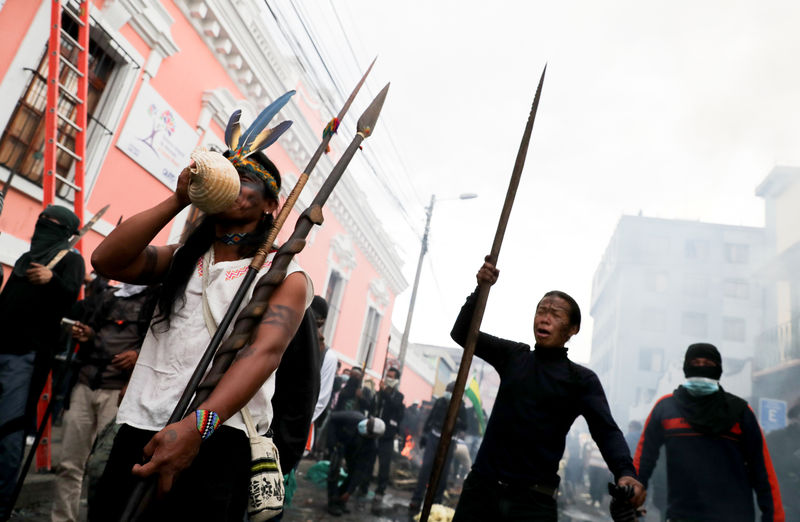By Carlos Garcia Rawlins and Alexandra Valencia
QUITO (Reuters) - Indigenous tribe representatives from the Amazon (NASDAQ:AMZN) in Ecuador joined an anti-austerity demonstration in Quito on Friday, as hopes for talks between protest leaders and the government dimmed following more than a week of unrest.
Thousands of protesters, many wearing the traditional bowler hats of highland Indians or the face paint of lowland tribes, marched through the streets of the capital to demand President Lenin Moreno repeal a law that ended a four-decade fuel subsidy.
Moreno announced the measure as a key part of efforts to reduce the fiscal deficit, in keeping with a loan deal with the International Monetary Fund (IMF). But protesters say it has hit the poor hardest and will increase inequality in the South American country of 17 million people.
"Leave, Lenin, leave!" protesters shouted as they marched before clashes erupted in parts of downtown, where anti-IMF and anti-Moreno graffiti covered buildings.
The protests first erupted last week when truck drivers took to the streets, but indigenous protesters have since taken the lead, with villagers from the highlands walking and hitching rides to reach Quito.
Representatives of Amazonian tribes, many carrying spears, streamed into the city late Thursday and early Friday, adding opposition to oil drilling to a growing list of complaints about Moreno's government.
The unrest has already led Moreno to relocate to a coastal city and slashed the OPEC-member nation's oil production, after protesters seized some wells.
Hopes of a negotiated end to the dispute appear distant.
The government has refused to reinstate the fuel subsidy and says it wants "peace" before holding any talks with protest organizers. Indigenous leaders have rejected negotiations as an attempt to derail their movement and have called for an end to a police crackdown on protesters after four died in the unrest.
"As long as each side is radicalizing their positions I think it'll be very hard, almost impossible, for there to be dialogue," Catholic Bishop Luis Cabrera told a local TV channel on Friday. "Trust needs to be regained."
